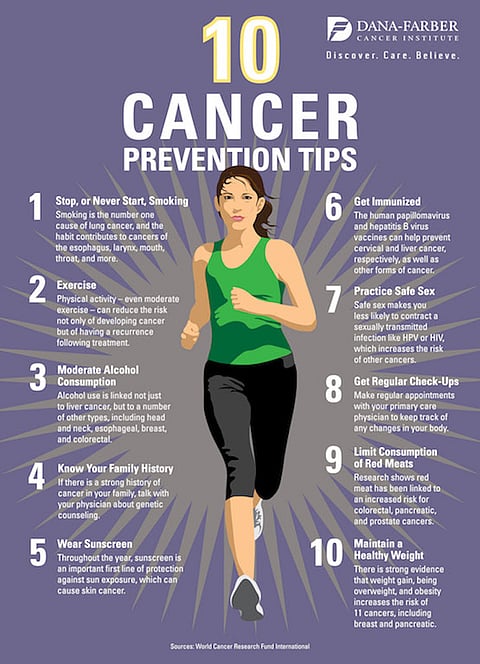

Welcome to our comprehensive guide on cancer risk reduction. Cancer is a formidable health concern, but there are steps you can take to reduce your risk. This resource will provide you with valuable insights and practical tips to help you make informed decisions about your lifestyle and healthcare choices.
Understanding Cancer Risk:
Cancer risk is influenced by a combination of genetic, environmental, and lifestyle factors. While some risks cannot be changed, there are numerous strategies to minimize your chances of developing cancer. It's essential to be proactive and take control of your health.
Maintain a Healthy Diet:
Eating a well-balanced diet rich in fruits, vegetables, and whole grains can reduce your cancer risk. Avoid or limit processed and red meats, and opt for lean proteins. Stay hydrated and watch your portion sizes to maintain a healthy weight, as obesity is linked to an increased risk of several cancers.
Stay Physically Active:
Regular physical activity is crucial for cancer risk reduction. Aim for at least 150 minutes of moderate-intensity exercise per week. Exercise helps control weight, improve immune function, and reduce inflammation, which are all important for cancer prevention.
Avoid Tobacco and Limit Alcohol:
Tobacco use is a leading cause of preventable cancer. Quitting smoking and avoiding exposure to secondhand smoke is one of the most significant steps you can take. Additionally, limit alcohol consumption, as excessive drinking can increase the risk of several cancers.
Protect Yourself from the Sun:
Skin cancer is one of the most preventable types of cancer. Protect your skin by using sunscreen, wearing protective clothing, and avoiding excessive sun exposure, especially during peak hours.
Get Vaccinated:
Certain vaccines, like the HPV vaccine and hepatitis B vaccine, can protect against viruses that are linked to cancer. Talk to your healthcare provider about recommended vaccinations.
Screenings and Early Detection:
Regular cancer screenings can detect cancer in its early stages when it's most treatable. Follow recommended screening guidelines for your age and risk factors, such as mammograms, Pap tests, colonoscopies, and more.
Know Your Family History:
Understanding your family's cancer history can help you assess your risk. If you have a family history of cancer, discuss your risk with a genetic counselor and consider genetic testing if appropriate.
Manage Stress:
Chronic stress can weaken the immune system and may contribute to cancer risk. Practice stress-reduction techniques such as meditation, yoga, or deep breathing to maintain emotional well-being.
Maintain a Healthy Immune System:
A robust immune system is your body's defense against cancer and other illnesses. To support your immune system, get enough sleep, manage stress, and maintain a healthy lifestyle. Nutrient-rich foods, regular exercise, and avoiding exposure to infections, like the human immunodeficiency virus (HIV), are essential in this regard.
Environmental Awareness:
Take steps to reduce exposure to environmental carcinogens. This includes minimizing contact with harmful chemicals, like asbestos, radon, and industrial pollutants, which can increase your cancer risk. Ensure proper ventilation in your living and working spaces and follow safety guidelines when handling hazardous materials.
Hormone Replacement Therapy:
For women, the use of hormone replacement therapy (HRT) during menopause should be carefully considered, as it can impact cancer risk. Discuss the benefits and risks of HRT with your healthcare provider to make an informed decision.
Dietary Supplements:
While a balanced diet is the best way to obtain essential nutrients, some individuals may require supplements. Consult with a healthcare professional before taking any dietary supplements, as high-dose or unnecessary supplementation can sometimes have adverse effects.
Stay Informed:
Cancer research and guidelines are constantly evolving. Stay informed about the latest developments in cancer prevention and treatment. Reliable sources such as the American Cancer Society, National Cancer Institute, and reputable healthcare organizations can provide up-to-date information.
Support Networks:
Coping with cancer risk and its associated stress can be challenging. Seek support from family, friends, or support groups. Sharing experiences and emotions with others who have faced similar challenges can be empowering.
Regular Health Check-ups:
Apart from cancer-specific screenings, make it a habit to have regular check-ups with your healthcare provider. These visits can help detect health issues early and provide an opportunity to discuss any concerns or changes in your health.
Positive Mindset:
A positive mindset can contribute to overall well-being. Maintaining an optimistic outlook, engaging in activities you enjoy, and surrounding yourself with a supportive social network can enhance your mental and emotional health.
